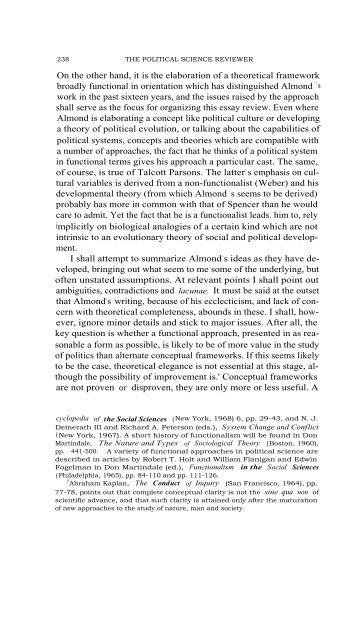FUNCTIONALISM AND ITS CRITICS - Intercollegiate Studies Institute
FUNCTIONALISM AND ITS CRITICS - Intercollegiate Studies Institute
FUNCTIONALISM AND ITS CRITICS - Intercollegiate Studies Institute
Create successful ePaper yourself
Turn your PDF publications into a flip-book with our unique Google optimized e-Paper software.
238 THE POLITICAL SCIENCE REVIEWER<br />
On the other hand, it is the elaboration of a theoretical framework<br />
broadly functional in orientation which has distinguished Almond ' s<br />
work in the past sixteen years, and the issues raised by the approach<br />
shall serve as the focus for organizing this essay review. Even where<br />
Almond is elaborating a concept like political culture or developing<br />
a theory of political evolution, or talking about the capabilities of<br />
political systems, concepts and theories which are compatible with<br />
a number of approaches, the fact that he thinks of a political system<br />
in functional terms gives his approach a particular cast. The same,<br />
of course, is true of Talcott Parsons. The latter ' s emphasis on cultural<br />
variables is derived from a non-functionalist (Weber) and his<br />
developmental theory (from which Almond ' s seems to be derived)<br />
probably has more in common with that of Spencer than he would<br />
care to admit. Yet the fact that he is a functionalist leads. him to, rely<br />
implicitly on biological analogies of a certain kind which are not<br />
intrinsic to an evolutionary theory of social and political development.<br />
I shall attempt to summarize Almond ' s ideas as they have developed,<br />
bringing out what seem to me some of the underlying, but<br />
often unstated assumptions. At relevant points I shall point out<br />
ambiguities, contradictions and lacunae. It must be said at the outset<br />
that Almond ' s writing, because of his ecclecticism, and lack of concern<br />
with theoretical completeness, abounds in these. I shall, however,<br />
ignore minor details and stick to major issues. After all, the<br />
key question is whether a functional approach, presented in as reasonable<br />
a form as possible, is likely to be of more value in the study<br />
of politics than alternate conceptual frameworks. If this seems likely<br />
to be the case, theoretical elegance is not essential at this stage, although<br />
the possibility of improvement is.' Conceptual frameworks<br />
are not proven or disproven, they are only more or less useful. A<br />
cyclopedia of the Social Sciences (New York, 1968) 6, pp. 29-43, and N. J.<br />
Demerath III and Richard A. Peterson (eds.), System Change and Conflict<br />
(New York, 1967). A short history of functionalism will be found in Don<br />
Martindale, The Nature and Types of Sociological Theory ( Boston, 1960),<br />
pp. 441-500. A variety of functional approaches in political science are .<br />
described in articles by Robert T. Holt and William Flanigan and Edwin<br />
Fogelman in Don Martindale (ed.), Functionalism in the Social Sciences<br />
( Philadelphia, 1965), pp. 84-110 and pp. 111-126.<br />
7 Abraham Kaplan, The Conduct of Inquiry (San Francisco, 1964), pp.<br />
77-78, points out that complete conceptual clarity is not the sine qua non of<br />
scientific advance, and that such clarity is attained only after the maturation<br />
of new approaches to the study of nature, man and society.
















